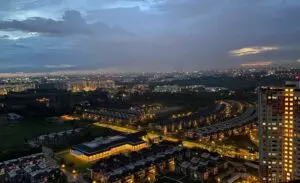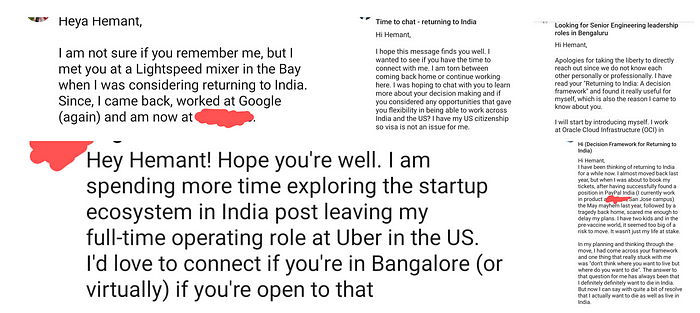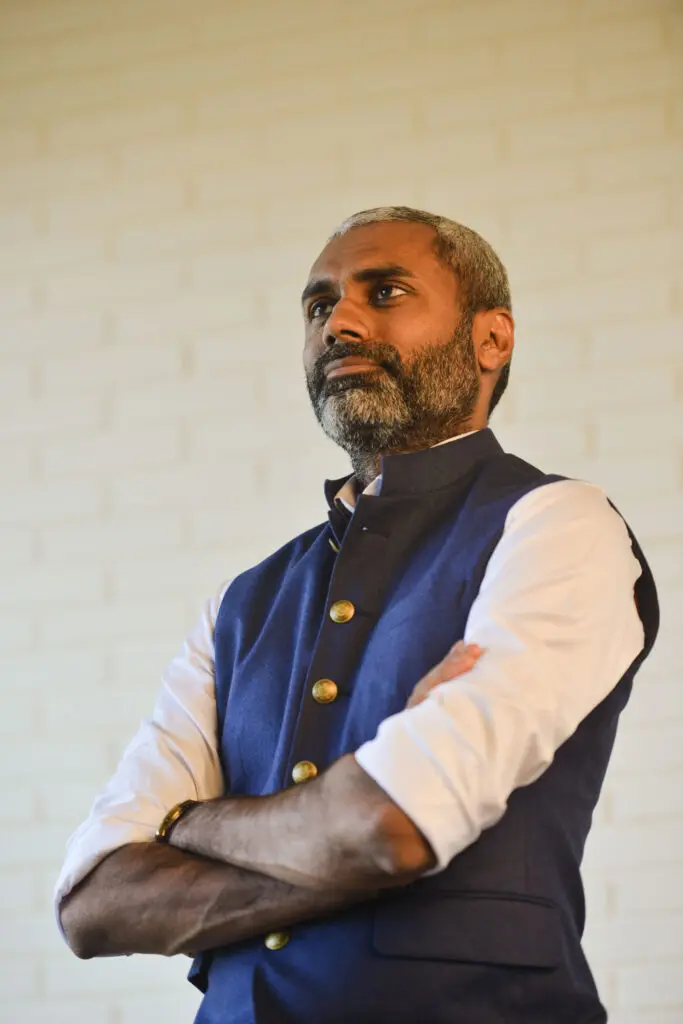
I returned to India mid 2018. I wrote about it here for the first time — and here again — as a way to retrospect on how I arrived at my decision to move back. I was having a good time in the US — lived there happily and happening-ly for over 15 years — but who knew that that wasn’t enough. It’s hard to believe that soon almost half a decade would have passed since.
5–6 years has been my “itch” — to change jobs, to change locations. I lived in Austin for ~6yrs @ AMD as an engineer. By the end of it, I needed to change my job, my role, and even my country! I moved to the UK to pursue an MBA then returned to US to work for Google as a PM/BizDev guy in San Francisco. 5–6yrs later I wanted to move again and shifted to venture capital with A16Z but by then I was already set on moving back to India sooner than later. A year after turning VC, I returned to India with Lightspeed.
This is, frankly, the very first time 5 years have passed and I’ve not felt even the slightest tinge of FOMO — I am exactly where I am supposed to be, doing what I am supposed to do. It’s a very… calming feeling. Things are never perfect, but when big, big pieces of your life settle into place, you suddenly notice that tension you never noticed before. Not because it’s there, but because it is not. Just like this quote by Gilbert. I recommend that feeling. I recommend chasing it.

So, how has it been? Whenever I tell people I love living in India, the response is often “yes, but at what cost?”. Cost is relative to what you care about. I should tell you up-front: I am left leaning, politically and fiscally liberal who believes in individual’s choices in religion, love, and life. I am also perfectly fine with high tax rates as long as they go towards fundamental needs such as education, healthcare, infrastructure, vs erecting statues and supporting outdated VIP culture.
I am also generally very suspicious and critical of the government — any government for that matter. I believe governments should get out of private businesses and focus on building clear and simple pro-innovation policies that allows citizens to take entrepreneurial risks while protecting consumers from fraud, misinformation, not just from other citizens but also from the government itself. I grew up in the military life where education and housing was ~free. My Kendriya Vidyalaya hindi medium education cost Rs 5/mo and we used to pay our fee of Rs 15 (0.5$ back in the late 90s) only once a quarter. But salaries, and therefore wealth generation, were ultra-low. I don’t have much consumerism in me — I wear pretty much the same jeans I’ve worn for 5–10years and shop 1–2 times a year for apparel. I only spend on flights, books, hotels, have recently picked up a hobby for fountain pens & Japanese inks, and bought my first Airpods & Bose headphone only in 2023 Jan!
So. How has it been? In a nutshell, returning to India has been one of the best decisions of my life. It’s been seamless and feels like home. India of 2015–16 was very different from India of 2018–22+. Pollution and traffic will continue to be an issue. Politics is what it is — a shit-show everywhere globally, though that’s no excuse. But I live ~15–30mins from office, and if you earn anywhere >30–40L/year INR, you can afford house-help and free up a large part of your day.
Let me tackle a few topics that keep coming up:
- Education & Health — India is highly competitive educationally. I don’t have kids but my sister’s kids both work harder than I did growing up. Getting into a good school itself takes several “tests”. Getting into college — esp the great ones — is hard, though nowadays kids are getting into many things beyond the usual engineering + medical sorts of stuff. Vast number of alternative careers in art, design, and freelancing have cropped up. Health facilities are top notch — I recently got my mother operated in BLR (a major operation requiring 5–7 day hospital stay) and the full bill was 6L INR all fully covered digitally by office health insurance. All the while, I was coordinating over whatsapp with my insurance provider. Things are cheap, and high quality. Reaching the hospital in an ambulance — should that be a need ever — is still a major issue given traffic. Overall, I was surprised to have no major complaints in how well we were taken care of.
- Job & Career — I’ve spoken about this before and it’s a very individual experience. So much depends on your level, role, company. Even gender plays a big role I am sure, though I can’t speak for it beyond my own. Last few years were pretty crazy in salaries; often heard engineering undergrads being offered 30–40L (45–50K USD) as starting salaries. If you live in BLR, a 2 BHK in a large gated society could cost anywhere between 50–70K INR monthly (~800 USD) in the mid/high-end range, all the way to 2L INR/mo at the upper end (2.5K USD). If you share with a spouse, or, often as the case is, with 1–2 other friends, you can do the math but overall it’s pretty reasonable. In Mumbai/Delhi the costs are higher. Other cities lower. If you are joining at VP+ level, salaries can touch as high as 100–150K US at the upper end (often include similar equity packages. You start to feel very economically “free” at this point. The down side of work in India are long hours, no real separation of work-life, startups can get really grindy, and there have been lot of hirings and firings in the ecosystem lately.
- Covid? India had a pretty tough period in 2021. At the start of Covid, it felt like we really had got it under control when the world was going to hell in a basket. I think we let it relax us and we got caught unprepared and paid a heavy price. I remember feeling genuine fear for a few months in 2021 when there were sirens every night and many of us were volunteering on calls to find beds for patients at night (most, if not many, of whom did not make it). In retrospect, knowing how bad it was in most other countries, I now wonder how much of it was avoidable vs par for the course. These days — and since late 2021 — things have been mostly open as usual. People still use masks here or there but mostly everyone is back to 95% the same ways as if Covid never happened. Covid was also the time I really was thankful I was in India with my family. Too many stories of people having sick parents in India while they were sick in a faraway country. India was also somewhat conservative in not approving mRNA vaccines, which seems to have been the right call in the end. We lucked out frankly because at the time it seemed like we made a mistake not approving mRNA vaccines.
- Entrepreneurship — this will take a whole another post on its own but needless to say, I felt I couldn’t have timed the market any better to become a VC and return to India. Over the last 4yrs, entrepreneurship has really reached far and wide. We see great founders — both bootstrapped and venture backed — coming out of previously unusual places such as Jaipur (our portco ProjectDiscovery in devtools space), Ahmedabad (our portco Hubilo in virtual events space), Kochi, Chandigarh, and of course the usual BLR, MUM, DEL, HYD and MAA/Chennai.
- Daily life — most of the things are quite smooth. I got my first rental via nobroker (but it ended up being a broker-owned account!), I pay rent, electricity bill all online; I have a cook + maid + laundry “bhaiyya” who take care of almost 90% of my daily/weekly needs. Groceries and most other things are available via amazon/swiggy/zepto/dunzo. Ola/Uber are easy enough though morning wait times can get long depending on your location. I often get luckier just hailing an auto on the street and pay them using gPay. I don’t negotiate as long as the rates are <2x of the equivalent on Ola auto. Even things like Bombay Shirt Project, or the Pant Projects make shopping for custom-made clothing super easy/fully online. The only time I need to go anywhere for anything is when I actually want to go somewhere e.g. a restaurant or coffee shop or a movie hall. Obviously, things will be more complicated with kids etc, but India also has the benefit of family/house-help.
What do I not like about India? Frankly not a lot if you know what to expect. For example, if you are looking for perfectly walkable sidewalks all over the city, or wheelchair access in every building, I’d strongly suggest stay in US/EU. These are not wrong things to ask for, but it’s just not the priority for the country. The move to India for me was all about where the puck was moving and my belief in the India story has only gotten stronger over time. I see the change on the ground that you won’t see on any slide deck w/ facts and figures.
The fact that I often forget to carry my wallet for days and realize that it didn’t matter because everyone has UPI. Or the fact that I have traveled on Indian highways in far off remote states like my hometown in Odisha — and didn’t even notice how smooth and high quality the roads were because the journey was so comfortable. Or that trains and flights come mostly on time, when I recall as a kid there were trains that ran a full day late sometimes! Or that I’ve not been to my bank in 5yrs nor stood in a line to buy a train or a flight ticket or to pay electricity bills, or water bills, or buy groceries. Or fact that all (?) toll roads in India are now FAST-tagged. Or that people now get their passports renewed in days not months, and so many more examples… that’s the India story that doesn’t show up on slides.

Isn’t the market really bad these days? Yes — globally. India still seems to be a bright spot in the global GDP growth story. That said, we may see some markdowns in private markets, we may see consumer spending slow down. We will also see a few companies fail. However, given the broader secular trends, the opportunity set for countries such as India on a 5 year horizon has never been brighter. Every month I get a lot of folks messaging me about how they are planning to, or have returned to India and making a dent. The next ten years are India’s to lose. Come home and build!
To read about other experiences of recent India returnees, we’ve curated a few of them here: https://www.comehomeandbuild.com/
-Hemant
Authors




